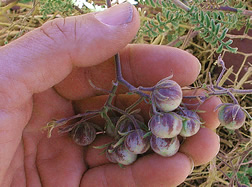This page has been archived and is being provided for reference purposes only. The page is no longer being updated, and therefore, links on the page may be invalid.
|
|
Tomato Trek Yields Chilean Treasure
By Marcia WoodDecember 30, 2005
Hearty tomato soup, rich and piping hot, makes a cheery mid-afternoon snack on a cold winter's day. Tomorrow, superb tomatoes for full-bodied soups or perhaps for salads of crisp greens may owe some of their pedigree to the rarest of Chile's wild tomatoes.
Plant explorers funded by the Agricultural Research Service—the U.S. Department of Agriculture's chief scientific research agency—collected seed from tomato relatives in a 14-day trek earlier this year through 2,379 miles of Chilean countryside.
The expedition, which took them from rugged coastal expanses to 12,000-foot-high reaches of the Andes, followed up on an equally arduous 2001 search. Both explorations yielded prized seed that will fill gaps in the C.M. Rick Tomato Genetics Resource Center's premier collection of the domesticated tomato's wild, rare and unusual relatives from Chile and elsewhere in South America—tomato's ancestral home.
Center director Roger T. Chetelat at the University of California-Davis organized the journey with colleagues from that campus and the University of Chile-Santiago.
The Davis center is part of a nationwide network of ARS-funded genebanks that safeguard relatives of crop plants, ensuring that the natural richness and diversity of their genetic makeup, or gene pool, isn't lost.
The Chilean specimens of Lycopersicon chilense, L. peruvianum, Solanum sitiens, and S. lycopersicoides that the scientists collected as seed bear bright-yellow or yellow-white flowers. The plants' petite green tomatoes, smaller than a typical cherry tomato, are unappetizing except to grazers like llamas, alpacas, vicuñas, guanacos, goats or sheep--or to certain insects.
The hardy plants may harbor valuable genes not found in other Chilean specimens at Davis. Those genes may enrich the nutritional value of tomorrow's supermarket and backyard garden tomatoes, L. esculentum, or perhaps boost resistance to its formidable insect and disease enemies.
Now, at Davis, plants are being grown from the wild tomato seed, so scientists can further investigate tomato's genetic diversity and can provide seed samples to other researchers and tomato breeders worldwide.

